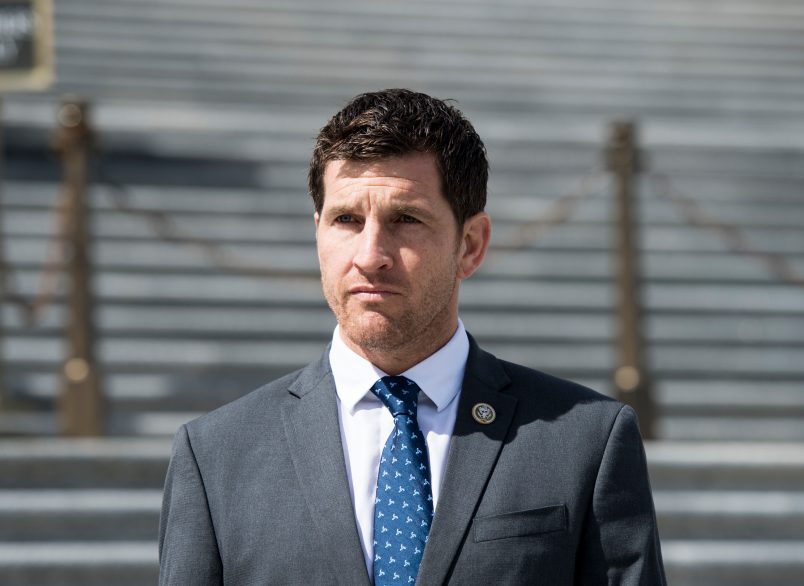Since news first broke in early August that some of Rep. Scott Taylor’s (R-VA) paid campaign staffers had allegedly forged signatures on official election filings, the congressman has promised to hold anyone involved accountable.
Filings from Taylor’s campaign Monday night, covering campaign expenses from July 1 through Sept. 30, show the opposite happened. Taylor’s campaign paid more than $40,000 to four of the staffers involved in the forgery allegations during that period, with payments continuing long after the staffers’ alleged involvement in the massive scheme was public knowledge and the subject of a lawsuit and special prosecutor’s investigation.
The payments for all four staffers occurred as recently as Sept. 12, weeks after the staffers’ alleged forgeries were known, after the Democratic Party of Virginia collected affidavits from dozens of voters who alleged that their signatures had been forged, and after a state judge said Taylor’s campaign had engaged in “out and out fraud.”
The filings also showed more than $11,000 in payments for legal services to several criminal and election law firms.
Taylor’s campaign didn’t respond to TPM’s questions about why the staffers were still being paid, nor if they will continue to receive salaries or consultant fees from the campaign in October and November.
The staffers are alleged to have forged scores of voters’ signatures — including signatures from dead voters, elected officials and elderly and disabled people — in an effort to help the 2016 Democratic congressional nominee in the Second District, Shaun Brown, get on the ballot as an independent candidate in 2018. The goal, apparently, was to siphon votes away from Democrats’ 2018 nominee, Elaine Luria, and help their boss’ campaign.
“My campaign has a zero-tolerance policy for inappropriate activities,” Taylor said in a statement on Aug. 7. A day earlier, he said in a since-deleted Facebook video: “You have my word, that if anyone in my campaign did anything that was wrong, that was illegal, or inappropriate or something like that, I would fire them in a second.”
At the same time, a special prosecutor was appointed to look into potential criminal violations, including potential felony charges for the forged signatures. The Democratic Party of Virginia filed a lawsuit to remove Brown from the ballot.
A month after Taylor’s Facebook video was published, on Sept. 6, Virginia Judge Gregory Rupe found “that every petition circulated by [Taylor campaign staffers] Lauren Creekmore, Heather Guillot, Roberta Marciano, Robert Catron, and David Boner [sic] must be struck,” and that the court was “satisfied” that “every petition circulated by these five individuals was done so with the intent to defraud the Commonwealth and its elected officials.” Brown was removed from the ballot.
From July 1 through Sept. 30, the recent filings show, Taylor’s campaign paid Creekmore $7,424.06, Guillot $13,500, Marciano $7,635.48 and Bohner — in payments to his LLC Validus — $15,000
In mid-August and September alone, after the scandal made headlines and the staffers’ names were public knowledge, they continued to receive checks from Taylor’s campaign. Creekmore and Marciano remained on the campaign payroll, receiving $1,207.25 twice a month. Guillot received three payments of $2,250 in between Aug. 16 and Sept. 12 for “campaign consulting.” And Bohner’s LLC received $10,500 between Aug. 9 and Sept. 12 for “campaign consulting” and “legal services.”
Another Taylor staffer who collected signatures for Brown, Nicholas Hornung, also continued to receive a $1,207.25 paycheck in August and September.
RollCall first reported on the election filings Tuesday.
In late August, TPM broke the story of Taylor personally calling a local Democratic Party volunteer, Lindsey Terry, in order to pressure her to take down the first public allegation of signature forgery against his campaign. Terry told TPM that Taylor was “threatening a lawsuit on [Guillot’s] behalf.” Taylor also said he’d had someone drive by Terry’s house to confirm her identity, she recalled to TPM.
Three days after his call to Terry, in the since-deleted Facebook video, Taylor said, likely referring to Guillot: “They also accused this private citizen of committing a crime of fraud. I mean, she should sue them. They defamed her publicly. I hope she does sue them.”







Paging Kris Kobach. I know this is not his state but you’d think he’d at least point to this to highlight the type of fraud that affects elections. Campaign staffers forging signatures to get a third Party candidate on the ballot - surely this deserves attention. I mean, we get stories on Democrats bussing in people to fraudently vote for a slice of pizza yet here we have staffers PAID to sign other people’s names on a form. WHERE IS THE OUTRAGE?
I would be very interested to see what Shaun Brown got out of this.
Oh and anyone who believes Taylor knew nothing about this (and paying these deceptive staffers AFTER the fact), I have a beautiful bridge in London to sell you…
This is so astounding to me. This is the district I’m in and this is the second time that news broke through TPM and was not to be seen anywhere else. I keep looking on line to find information about what is happening with Taylor and there is nothing.
The fact that he stated he had fired his staff involved in criminal signature gathering almost 2 months ago and now TPM has discovered they’ve been on the books much longer than that.
Last I checked Elaine Luria was ahead of this sleezeball by about 8 points.
Virginia is new to me and I just can’t believe they don’t have current information on what is happening.
Sorry dude. what a dishonest jerk he is.
Guy is a criminal … so … wait for it …
LOCK HIM UP!!!